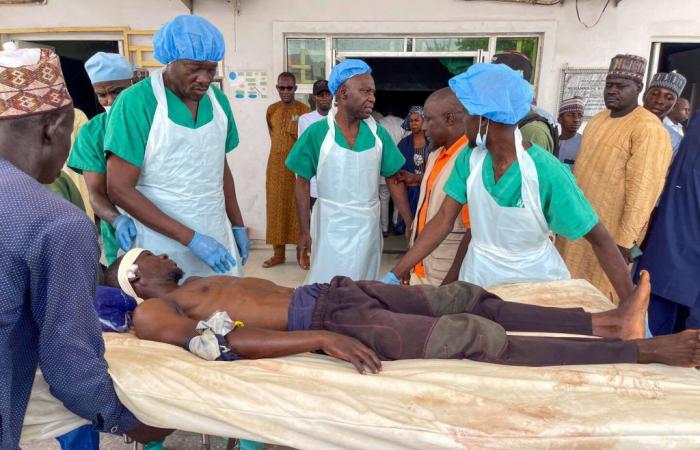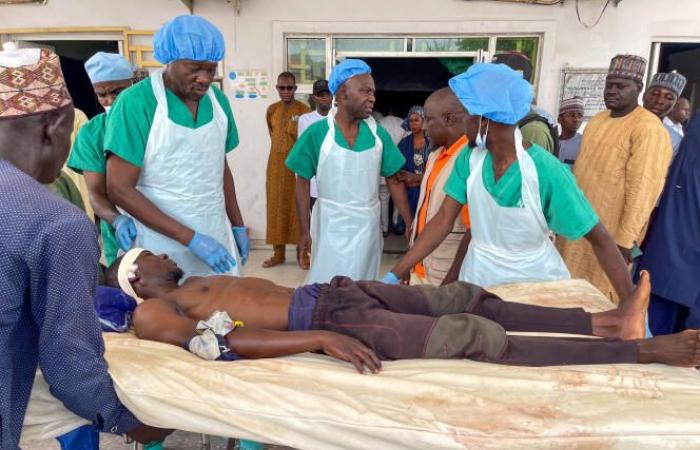Abubakar Buba was attending a wedding on Saturday afternoon, June 29, in the town of Gwoza, in northeastern Nigeria near the Cameroonian border, when a “woman holding two children by the hand entered”. Then there was an explosion. Wounded in this suicide attack, he was transported like other victims to a hospital in Maiduguri, the capital of Borno state.
“I heard an explosion and then there was chaos, dead and injured everywhere”testified in the same hospital Mohammed Amadu who was also present at the wedding and who had a broken leg in the explosion.
Read also | The double punishment of Boko Haram survivors
Add to your selections
A town of nearly 400,000 inhabitants, Gwoza was the scene of four almost simultaneous suicide attacks on Saturday, including at least three perpetrated by female suicide bombers, which left at least 18 dead and around forty injured.
The attacks, which have not yet been claimed, were a painful reminder to residents that the Nigerian jihadist group Boko Haram still poses a real threat.
“Not an isolated episode”
Deeply rooted in this region of Nigeria bordering Cameroon, Boko Haram is known for having used female suicide bombers in its armed struggle to establish a caliphate in northeastern Nigeria against soft targets such as markets, schools, mosques, churches and large gatherings of civilians.
Suicide attacks have been rare in Nigeria recently, with jihadist fighters using other methods of action: kidnappings, killings, looting, etc.
Read also | In Nigeria, one year after the presidential election, the cost of living has exploded
Add to your selections
Boko Haram seized Gwoza in 2014 and declared it a caliphate after seizing part of Borno state. The town was retaken by the Nigerian army with the help of Chadian forces in 2015, but the jihadist group continues to launch attacks from the mountains overlooking the town, on the border with Cameroon.
Nigerian President Bola Ahmed Tinubu has “strongly condemned suicide attacks” in a press release on Sunday, seeing “a clear manifestation of the pressure against terrorists and the success recorded in weakening their attack capabilities”. “These cowardly attacks are just an isolated episode”adds the head of state, who assures that he “will not allow the nation to enter an era of fear, tears, sorrow and blood”.
Four attacks
Having come to power a year ago, Mr Tinubu had made the fight against insecurity a priority of his mandate, but the results are slow in coming.
A first attack took place on Saturday during the wedding ceremony, when a suicide bomber set off explosives among the guests. A second attack, also carried out by a woman according to witnesses, took place shortly afterwards at the same location.
Read also | In northern Nigeria, residents stifled by economic crisis and insecurity
Add to your selections
A few minutes later, an explosion “from another device by a teenage girl” The incident occurred near the city’s general hospital, a local emergency services official added.
Follow us on WhatsApp
Stay informed
Receive the essential African news on WhatsApp with the “Monde Afrique” channel
Join
A member of the anti-jihadist militia who assists the army in Gwoza told AFP that a fourth suicide attack had targeted a security post, killing three people including a soldier. This report has not yet been confirmed from an official source.
More than 40,000 deaths in fifteen years
“This takes me back to 2014, when Gwoza was occupied by these terrorist groups”Baba Shehu Saidu told AFP at Maiduguri hospital, after losing five members of his family in one of the attacks on Saturday.
“The situation is calm, the army is in the city”Fatima Musa, a local government official in Gwoza, told AFP on Sunday morning, who fears that “People will continue to be afraid”.
Read the report: Article reserved for our subscribers Entire areas of Nigeria under the control of “bandits” and warlords
Add to your selections
The jihadist violence, which has lasted for fifteen years, has left more than 40,000 dead and displaced some 2 million people in the northeast of the country.
Insecurity remains very high even if Boko Haram has lost ground in recent years, in particular due to its competition with the Islamic State group in West Africa (Iswap), born from a split from Boko Haram.
Jihadist fighters continue to regularly attack rural communities in Nigeria, killing men and abducting women who venture out of town in search of firewood.







